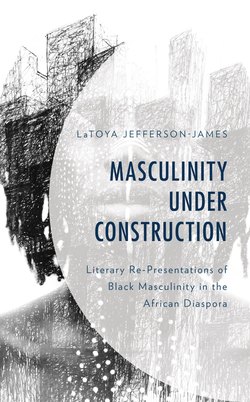Masculinity Under Construction

Реклама. ООО «ЛитРес», ИНН: 7719571260.
Оглавление
LaToya Jefferson-James. Masculinity Under Construction
Foreword
Author’s Note
Acknowledgments
Introduction
Notes
Racialized Degendering
I. Terminology and Methodology
II. Racialized Degendering
Notes
Black Men, Oppositional Definitions, and Primordial Africa
Notes
Black Masculine Identities from Their Own Histories
Notes
A Word on Black Feminists, Womanists, and Black Men
Notes
Concerns of the Heart(h)
Notes
Out of Necessity
Notes
Conclusion
Bibliography
Index
About the Author
Отрывок из книги
Like every other burgeoning American academic, I would like to claim total authenticity for this text. I would like to say that this text is new, exciting, and an unmistakable radical revision of my entire theoretical field—Black masculinity in anti/postcolonial texts. While it is true that I have been thinking on this subject matter and reading these canonical texts for well over a decade, I did not arrive at any of these conclusions as a lone, American (rather African American) academic. To the contrary, many of my observation have been influenced by the works of Una Marson, James Baldwin, Raewyn Connell, Michael Kimmel, Maryse Conde, Toni Morrison, bell hooks, Angela Y. Davis, Frantz Fanon, Aime Césaire, J. Michael Dash, Edouard Glissant, A. Benitez-Rojo, F. Abiola Irele, Adetayo Alabi, C. L. R. James, Honor Ford-Smith, Alison Donnell, Gail Bederman, El Hajj Malik Shabazz, Sembene Ousmane, Walter Rodney, Elsa Goveia, Wole Soyinka, Mariama Ba, Ngugi wa Thiong’o, Lorraine Hansberry, Patricia Hill Collins, Patricia Williams, Chinua Achebe, George Lamming, Bessie Head, and Earl Lovelace. This is not an exhaustive list, but my dear Reader, I feel you understand by now.
While I am ultimately proud of the work that I am putting forth, I am also saddened by some of the things that I was not able to include. For example, I did not include any poetry. Poetry, by its nature, is deserving of its own book-length study and certainly not a single chapter in this one. Because I decided to end this text at some point in some time, I excluded several equally deserving authors. For instance, I did not include Merle Hodge, I missed including the subversive laughter of Maryse Conde, and Peepal Tree Publishers recently reprinted two early plays of Una Marson that are in need of analyzing for the gender dynamics and representations of the African Diaspora included in both of these early twentieth century productions. And while I have attempted to de-essentialize the African American experience as the Black experience, I have not included Black Hispanic writers. It was not for carelessness that I omitted these writers—rather it is out of my nervousness surrounding the nature of this project. Admittedly, most of the theoretical and primary writers who inform my thought are overwhelmingly Anglophone or Francophone both in the Caribbean and Africa. Perhaps Black Hispanic writers will appear if there is an updated edition?
.....
Baldwin, James. “Down at the Cross,” in Baldwin: Collected Essays,” edited by Toni Morrison (New York: Library of the Americas, 1998), 341.
2.
.....